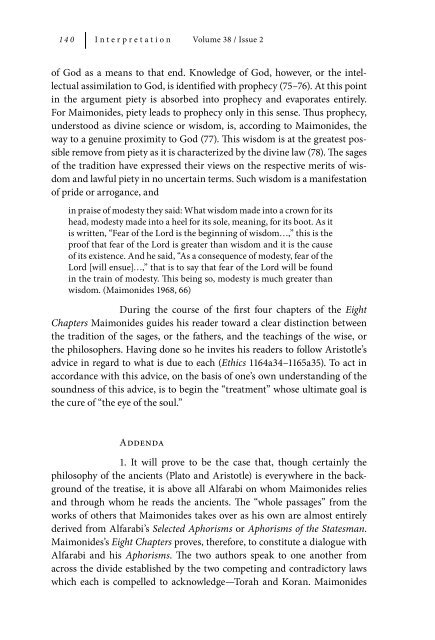105 119 147 171 177 197 - Interpretation: A Journal of Political ...
105 119 147 171 177 197 - Interpretation: A Journal of Political ...
105 119 147 171 177 197 - Interpretation: A Journal of Political ...
You also want an ePaper? Increase the reach of your titles
YUMPU automatically turns print PDFs into web optimized ePapers that Google loves.
1 4 0 I n t e r p r e t a t i o n Volume 38 / Issue 2<br />
<strong>of</strong> God as a means to that end. Knowledge <strong>of</strong> God, however, or the intellectual<br />
assimilation to God, is identified with prophecy (75–76). At this point<br />
in the argument piety is absorbed into prophecy and evaporates entirely.<br />
For Maimonides, piety leads to prophecy only in this sense. Thus prophecy,<br />
understood as divine science or wisdom, is, according to Maimonides, the<br />
way to a genuine proximity to God (77). This wisdom is at the greatest possible<br />
remove from piety as it is characterized by the divine law (78). The sages<br />
<strong>of</strong> the tradition have expressed their views on the respective merits <strong>of</strong> wisdom<br />
and lawful piety in no uncertain terms. Such wisdom is a manifestation<br />
<strong>of</strong> pride or arrogance, and<br />
in praise <strong>of</strong> modesty they said: What wisdom made into a crown for its<br />
head, modesty made into a heel for its sole, meaning, for its boot. As it<br />
is written, “Fear <strong>of</strong> the Lord is the beginning <strong>of</strong> wisdom…,” this is the<br />
pro<strong>of</strong> that fear <strong>of</strong> the Lord is greater than wisdom and it is the cause<br />
<strong>of</strong> its existence. And he said, “As a consequence <strong>of</strong> modesty, fear <strong>of</strong> the<br />
Lord [will ensue]…,” that is to say that fear <strong>of</strong> the Lord will be found<br />
in the train <strong>of</strong> modesty. This being so, modesty is much greater than<br />
wisdom. (Maimonides 1968, 66)<br />
During the course <strong>of</strong> the first four chapters <strong>of</strong> the Eight<br />
Chapters Maimonides guides his reader toward a clear distinction between<br />
the tradition <strong>of</strong> the sages, or the fathers, and the teachings <strong>of</strong> the wise, or<br />
the philosophers. Having done so he invites his readers to follow Aristotle’s<br />
advice in regard to what is due to each (Ethics 1164a34–1165a35). To act in<br />
accordance with this advice, on the basis <strong>of</strong> one’s own understanding <strong>of</strong> the<br />
soundness <strong>of</strong> this advice, is to begin the “treatment” whose ultimate goal is<br />
the cure <strong>of</strong> “the eye <strong>of</strong> the soul.”<br />
Addenda<br />
1. It will prove to be the case that, though certainly the<br />
philosophy <strong>of</strong> the ancients (Plato and Aristotle) is everywhere in the background<br />
<strong>of</strong> the treatise, it is above all Alfarabi on whom Maimonides relies<br />
and through whom he reads the ancients. The “whole passages” from the<br />
works <strong>of</strong> others that Maimonides takes over as his own are almost entirely<br />
derived from Alfarabi’s Selected Aphorisms or Aphorisms <strong>of</strong> the Statesman.<br />
Maimonides’s Eight Chapters proves, therefore, to constitute a dialogue with<br />
Alfarabi and his Aphorisms. The two authors speak to one another from<br />
across the divide established by the two competing and contradictory laws<br />
which each is compelled to acknowledge—Torah and Koran. Maimonides
















